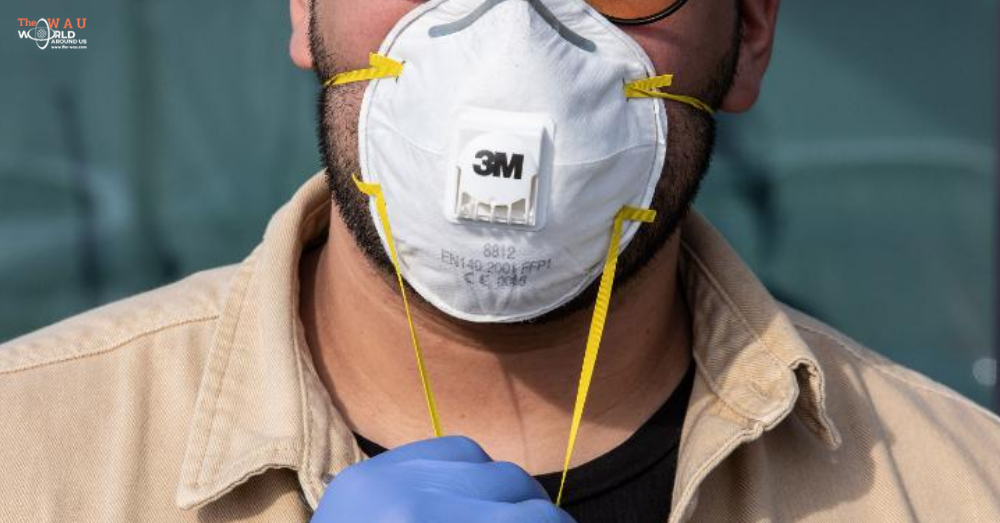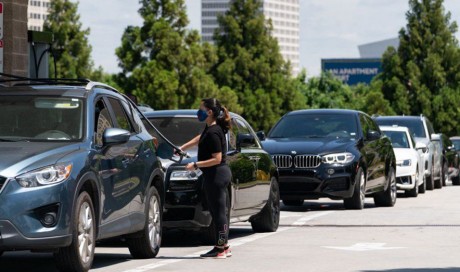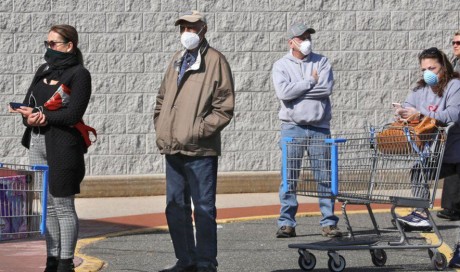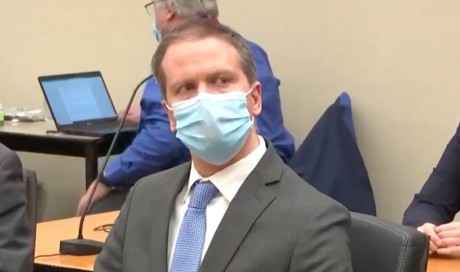There are the exam gloves, the surgical masks, the dubious supplements and the deceptive disinfectants. If unchecked Internet information is any guide, there’s an inexhaustible list of products you should buy to prepare for the spread of coronavirus in the United States — which, according to U.S. health officials, now appears inevitable.
But here’s the thing: The virus may be novel, but you really don’t need to buy anything new or special to brace for it. The Washington Post spoke to epidemiology experts, and they said the most important aspect of preparedness costs nothing at all — calm.
As of Wednesday afternoon, 59 people had the virus in the United States, all but 17 of them evacuees from the Diamond Princess cruise ship. But officials with the Centers for Disease Control and Prevention said they expect to see the number of cases increase as the disease spreads, while also stressing that the immediate risk remains low.
So here’s what doctors, researchers and the CDC say you can do now — and in the event of a future outbreak — to prepare and protect yourself.
‘Don’t panic’
Timothy Brewer is a professor of epidemiology and medicine at UCLA’s Fielding School of Public Health and its David Geffen School of Medicine, yet his central piece of advice is not exactly medical.
“Don’t panic,” he said. “There’s no value in panicking or telling people to be afraid. Don’t let fear and emotion drive the response to this virus. That can be extremely difficult because it is new, and we’re still learning about it, but don’t allow fear of what we don’t know about the virus to overwhelm what we do know.”
Brewer said it’s important to remember that covid-19, the disease caused by the novel coronavirus, is a respiratory disease, as is influenza, and while there’s not a vaccine for it, there are tried-and-true ways to deal with this type of illness — which we will cover here.
Saskia V. Popescu is a senior infection-prevention epidemiologist for a Phoenix-based hospital system. “The most important thing right now is to remain calm,” she said. “Remember, we don’t have that many cases in the U.S., and prevention strategies for this coronavirus are not new. We’ve been doing them for years.”
The basics
A few minutes into a phone call with this reporter, Brewer paused, coughed and then explained himself. “I’m currently recovering from a non-covid respiratory virus,” he said.
But the precautions he took when fighting his influenza-like illness are no different from what people should be doing every day to stave off coronavirus and other respiratory diseases, Brewer said.
You’ve seen the guidance before: Wash your hands regularly. Cover your nose and mouth when you sneeze. And when you’re sick, stay home from work or school and drink lots of fluids.
The CDC recommends washing with soap and water for at least 20 seconds after using the bathroom, before eating and after blowing your nose or sneezing. It also advises not to touch your eyes, nose and mouth and to clean objects and surfaces you touch often.
“These are all things you can do to prevent the spread of pretty much any respiratory virus,” Brewer said.
And for the record, he added, he stayed home sick last week.
“I practiced what I preached,” Brewer said.
Keep the shopping cart light
You probably don’t need to buy anything new, but if you’re already on your way to CVS, Brewer has some advice.
“Don’t go crazy,” he said. “You don’t need to go out and stock up on lots of things.”
And those surgical masks? If you’re not sick, you don’t need to wear them — and you certainly don’t need to buy every box your local pharmacy has in stock.
“The main point of the mask is to keep someone who is infected with the virus from spreading it to others,” Brewer said.
The CDC agrees, writing on its website: “CDC does not recommend that people who are well wear a facemask to protect themselves from respiratory diseases.”
Do face masks work? An expert explains.
Medical face masks are often used during flu season or a virus outbreak. Demand for masks is high in China amid the coronavirus outbreak. (Elyse Samuels/The Washington Post)
Common surgical masks block the droplets coming out of a sick person from getting into the air, but they are not tight enough to prevent what’s already in the air from getting in.
There are specialized masks — known as N95 masks because they filter out 95 percent of airborne particles — that are more effective, and some online retailers are sold out of them. But there’s a problem: The masks are difficult to use without training. They must be fitted and tested to work properly.
“If you just buy them at CVS, you’re not going to do all that,” Brewer said. “You’re not going to get it fit-tested, and you’re not going to be wearing it properly, so all you’ve done is spend a lot of money on a very fancy face mask.”
The same goes for exam gloves, Brewer said, which can get contaminated just like our hands. There’s no need for them if you’re washing your hands properly and often, he said.
If you’re itching to buy something, you can stick to the typical respiratory-virus medicine: decongestants, anti-inflammatory drugs and acetaminophen for fevers.
'Practice makes permanent’
Popescu has had a bag packed since she was in graduate school — if she didn’t have one, she said, she would feel like a bad public-health-emergency advocate. She explained one of the best things you can do to prepare for any emergency, including a coronavirus outbreak, is put together an emergency kit.
Hers contains a first-aid kit, flashlights, a space blanket, an external battery for her cellphone, a change of clothes and extra food for her dog. The CDC has a useful checklist for families.
It’s also important to have plans in place in case the outbreak disrupts your daily routines, Popescu said. You should be asking yourself: What if schools close for a week or two? What if there are issues with public transportation? What if I have to work from home or stay at work late?
You should have a plan for child care, for getting to work and for feeding pets, she said.
“A lot of preparedness is planning ahead of time,” Popescu said. “Practice makes permanent. If I have a plan, that means I don’t have to panic.”
And it’s good advice in general, she added, not just in the age of coronavirus.
“This is a good reminder to go through your resources and your plans so that, should it get more serious, you are not taken off guard,” she said. “People think they need to go out and buy stuff, but so much of it is just having a plan.”
Be mindful of where you are
Health officials have stressed keeping your distance from people who are sick, especially when it comes to respiratory viruses.
And because there is no medical solution for coronavirus, preventive steps and awareness are really the best tools at your disposal, said Stanley Perlman, an infectious-disease expert at the University of Iowa.
It is worth considering limiting exposure to large groups, especially during flu season. “Any congregation of people is a setup for spreading an infectious agent,” he said.
Most of us like to look at our smartphones and wear headphones, but in confined spaces, such as mass transit, it’s important to look around and see what’s going on, see where everyone’s hands are going and make a mental note to wash up later.
“We remember hand-washing at home but not when we get off a subway or leave the grocery store,” Popescu said. She also recommends avoiding the middle of a packed train car and doing your best to turn away if someone is coughing nearby.
But awareness cuts both ways. While the United States is likely to have more coronavirus cases, she said, it is important not to panic. “Just because someone has the sniffles or has a cough, it doesn’t mean they have the coronavirus,” she said. “There are a lot of respiratory viruses.”
Watch what you read
While coronavirus is spreading rapidly, so is misinformation about it. Popescu and other experts call this an “infodemic,” and it can be as harmful as any disease.
Hoaxes, lies and junk science about coronavirus have swirled online since the earliest cases were reported, mostly through social media.
“People are more click-susceptible during these events because there’s more info and people aren’t sure who to trust,” University of Washington researcher Jevin West told The Post this month.
Look to trustworthy sources, such as the CDC, the World Health Organization and local health departments, to stay informed, Popescu said — not the anonymous user doling out advice in Twitter mentions.
“It can be really easy to go online, buy supplies and freak out and then just stay on Facebook,” she said. “But stay up to date.”
Be kind
On college campuses, at a music conservatory, in Chinese restaurants, among the ranks of a famous dance troupe and on streets every day, Asians have reported a rise in aggressions micro and macro.
As coronavirus has spread, so, too, has anti-Asian prejudice.
The WHO has urged government agencies to do what they can to prevent discrimination against specific populations, since stigmatization can fuel the spread of the outbreak by driving marginalized individuals to hide infection and avoid seeking treatment.
“Remember to not let fear override your common humanity about how you treat other people,” Brewer said. “Just remember we’re all in this together. This is a virus. It does not think. It is not planning. We shouldn’t be blaming our neighbors or our fellow colleagues or people in the community because a virus happens to exist and is spreading.”
Share This Post















